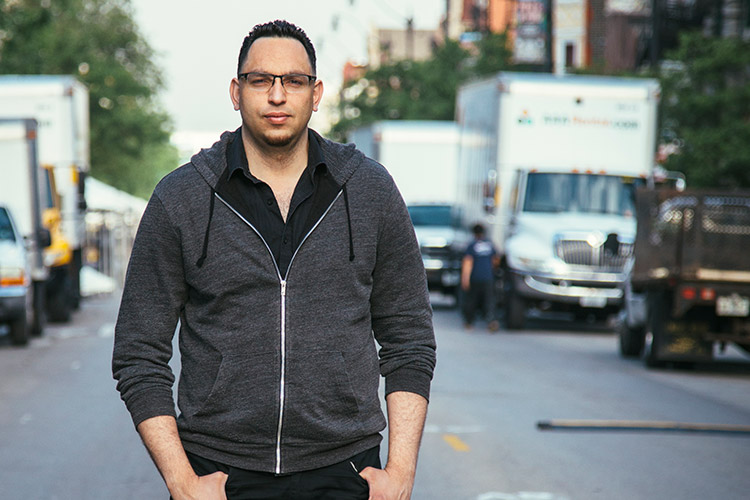
Carlos A. Roa Jr. (ARCH ’16), Chicago
Immigration Activist
Venezuelan-born Carlos Roa Jr. became an activist in 2007 to share his immigration story. After three years spent connecting with other young undocumented individuals and like-minded supporters in the United States, Roa, along with three other activists, embarked on a 1,500-mile trek from Miami to Washington, D.C., meeting with representatives and legislators at the local, state, and federal levels. In 2012 former President Barack Obama issued an executive order granting certain undocumented youth administrative relief under the Deferred Action for Childhood Arrivals (DACA) program.
Why did your parents emigrate from Venezuela?
My grandfather, a U.S. citizen for more than 30 years, got sick in 1989 and my father came to the States to take care of him. My father petitioned to become a U.S. permanent resident but only three months into the process, my grandfather passed away. My dad decided afterward to bring my mother, my sister, and me from Caracas to New York so that we could establish ourselves in the U.S. My parents couldn’t foresee that in their lifetime unfortunate circumstances would combine to deny my family’s ability to adjust to our immigration status. My parents could’ve gone back after the first few difficult years, but they decided to make all of the sacrifices necessary so that my sisters and I could get educated here.
Share some memories from your Miami to Washington, D.C., immigration walk.
When I became an activist in 2007, I had one goal in mind—to share my immigration story. That meant I would do everything possible to get my story out there and connect with other young undocumented youth and like-minded individuals. My fellow walkers and I had participated in countless demonstrations and peaceful protests, activist trainings, interviews, and events, so by the time we decided to embark on the walk in 2010, we were already experienced and knowledgeable activists ready to confront difficult situations. The most challenging moment on the walk was probably when we went to Nahunta, Georgia. The Ku Klux Klan was having a rally about stopping the invasion of illegals and sex offenders, along with other issues. We went there in order to counter-demonstrate, alongside the NAACP. Living in Miami, I had never seen the Klan out in public like that. There must have been 50–100 people in the rally. Our side was smaller but we felt it important to show who we really are and confront hate head on.
During our walk we met with mostly staff of different representatives and legislators at the local, state, and federal levels. When we made it to Washington, we met with senators such as Dick Durbin and several representatives from across the country. Our notable meetings were with Valerie Jarrett, President Obama’s closest advisor, and other White House staff. We presented more than 10,000 signed petitions advocating for administrative relief for undocumented youth. [The officials] insisted the president was powerless on the situation and that he could not override Congress, even though we knew it was under his purview to do so from constitutional immigration law professors. It was only until two years later in 2012 and under more political pressure that President Obama issued the Execution Action granting undocumented youth administrative relief under DACA.
The walkers and I still keep in touch. I’m grateful to say that we’re living very successful lives and are all involved in immigrant and LGBTQ issues to different degrees. Although my parents didn’t raise my little sister and me to be activists ourselves, they were very aware politically and socially. My sister was named after Caroline Kennedy, and I knew of my parents’ political inclinations from an early age. Part of the reason I became an activist and my understanding of my place in the world came out of a foundation that was laid at home.
Your personal connection aside, why are you an activist?
For a long time now, I have had a deep understanding of the importance of civic engagement, especially that of the civil rights movement in the U.S. There are so many important issues pertaining to our humanity and our well-being in general that if I can do my part by making our lives and society better, then why not participate? The difference you can make is incredible if you truly dedicate yourself to a cause or interest. I view it as my social responsibility for having the capacity that I have.
How are you advocating for immigration issues today?
These days I’m involved in different ways than when I was a college student. I am occasionally asked to write opinion pieces by outlets such as The Guardian or I’m interviewed—most notably by the New York Times this past November after the election on being a DACA recipient and what it would mean if the Trump Administration would get rid of DACA.
What are three considerations you would like IIT Magazine readers to keep in mind as the situation of undocumented immigrants in the U.S. continues to unfold?
First, I would like readers to keep in mind how difficult it is for undocumented youth and their families to live in this country, and how much we contribute to the well-being of this population as generations of immigrants have done before us. Second, there many reasons—push and pull factors—that make us migrate and integrate our lives here, whether it be from fleeing violence or economic instability in our home countries, or countless other reasons. Third, be very aware and truly critical in thinking about the subject of immigration rather than listen to all of the anti-immigrant hysteria created about us. It’s incredible but the same language and scapegoating that I heard from some of the KKK in Nahunta is very similar to what I hear national political figures ascribe to undocumented immigrants. Instead, get to know people that help immigrants for a living or talk to immigrants yourself to get a realistic sense of things and understand humanity better.